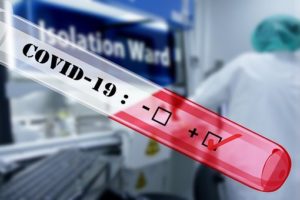
As we start our blog series, I think it’s important to start off with what we do know. This information was gathered from trusted, evidence-based resources listed at the end of this article. Be careful about where you are getting your information. Always check your sources (we will cover this more later this week).
What is COVID-19?
COVID-19 is a type of Coronavirus. It is also sometimes referred to as SARS-CoV-2. There are many different types of coronaviruses. They can cause illness in both humans and animals. Coronaviruses have been present all over the world for some time. They are known to cause upper respiratory symptoms like a cough or runny nose. They can also cause more serious illness.
COVID-19 is the novel (new) coronavirus that we are currently coping with. It was first identified in Wuhan, China in late 2019. It is now a worldwide pandemic. A pandemic means a global outbreak of disease. The World Health Organization (WHO) will declare a pandemic when a new disease, for which humans do not have any immunity, spreads around the world. In order for there to be a pandemic, there must be evidence of community spread. Community spread is the spread of an infection from one person to others in the community.
Pandemic is NOT meant to spark panic and hoarding of goods. It is meant to encourage action by countries to “detect, test, treat, isolate, trace and mobilize (theguardian.com).”
This is where we are now.
How is it spread? What are the symptoms?
COVID-19 spreads through droplets produced when someone with the virus coughs or sneezes on someone. It also tends to occur when people are close to each other (6 feet or less). This is why handwashing, not touching your face, wiping down surfaces and social distancing are so important.
Symptoms of infection include fever, cough, and shortness of breath. Symptoms can appear 2-14 days after exposure. This is why you are hearing about folks being quarantined for 14 days (especially after travel). Some people who are exposed and would have a positive test for COVID-19 will never show any symptoms. Others can get very sick. These tend to be individuals in higher-risk categories – including people with cancer.
What does it mean to be a high risk?
High risk means you have a higher risk of getting seriously ill if you are exposed. So far, we have seen serious illness in people over 70 as well as those who have pre-existing health conditions like heart disease, diabetes, and cancer. These folks typically have suppressed immune systems. There is some evidence that those with blood cancers (leukemia, lymphoma and multiple myeloma) are at an even higher risk due to the disease’s effect on their immune system.
Since this virus and its associated disease and impacts are still fairly new, there is very little evidence about how COVID-19 will specifically affect cancer patients. There are some early studies from China that have shown that cancer patients may be at a higher risk for “severe events.” However, the data comes from a very small sample size. Read more about this study here.
Tomorrow, we will address continuing cancer treatment through the pandemic and what you need to know about going to your treatment center. We will also provide some suggestions for staying safe while navigating our new pandemic normal.
References and Resources
CDC Coronavirus (COVID-19) website
https://www.cdc.gov/coronavirus/2019-ncov/index.html
World Health Organization
https://www.who.int/emergencies/diseases/novel-coronavirus-2019
Cancer Support Community
What cancer patients, survivors and caregivers need to know about the coronavirus.
American Society of Clinical Oncology(ASCO)
Coronavirus Resources.
https://www.asco.org/asco-coronavirus-information
Leukemia and Lymphoma Society
Coronavirus: resources and what you should know.
https://www.lls.org/public-health/coronavirus
European Society of Blood and Marrow Transplantation
Coronavirus Disease COVID-19: EMBT Recommendations.
Fred Hutchinson Cancer Center
Coronavirus: what cancer patients need to know.
American Cancer Society
Common questions about the new coronavirus outbreak.
https://www.cancer.org/latest-news/common-questions-about-the-new-coronavirus-outbreak.html
I have heard that Decadron is a medication that can treat Covid 19 Pneumonia symptoms, yet is not being studied or available as a drug to cure Symptoms of the pandemic. Have you any information as to the ability of Decadron to fight this Covid 19 influenza?
You can learn more about the use of dexamethasone (decadron) and its use in treating COVID-19 here.
https://www.who.int/news-room/q-a-detail/q-a-dexamethasone-and-covid-19